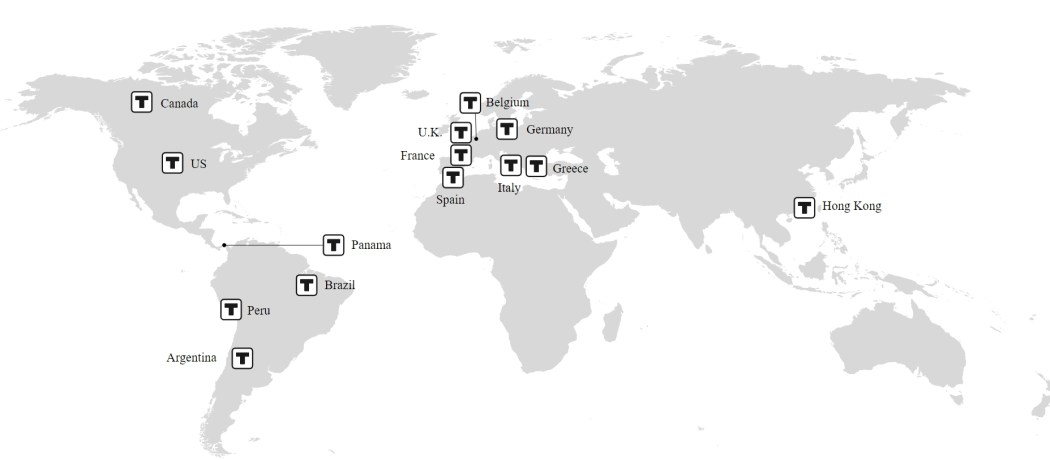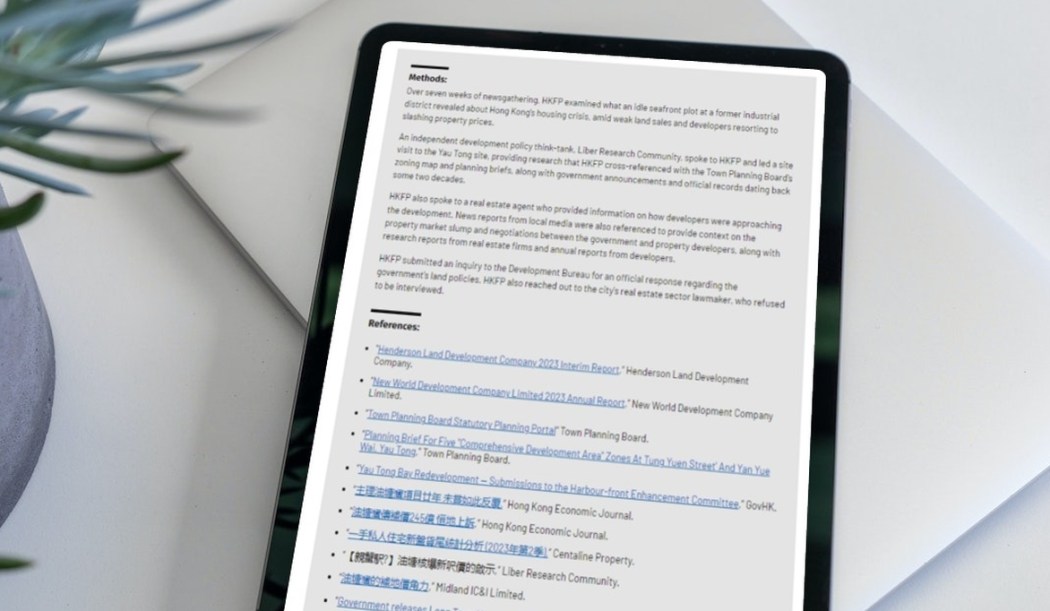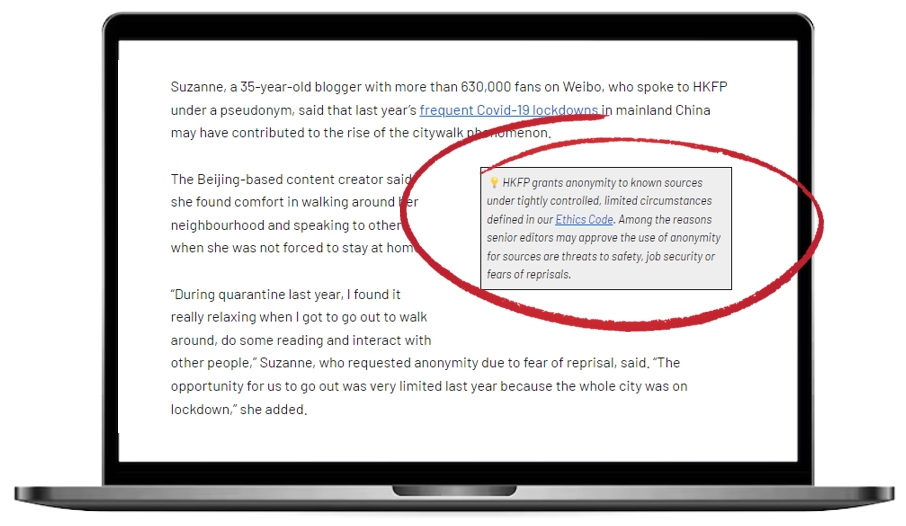Hong Kong Free Press is proud to have gained the Trust Project hallmark – the first global transparency standard that proves a news outlet’s commitment to original reporting, accuracy, inclusion, and fairness.
Throughout this year, HKFP has been publicly disclosing and expanding its ethical policies, standards, reporting and corrections guidelines to adhere to the eight Trust Indicators. The move seeks to improve media literacy and battle “fake news,” misinformation and online propaganda.

First adopted in March 2020, our newly-revamped guidelines lay out HKFP’s mission, our priorities, our expectations for staff conduct and impartiality, as well as how we deal with issues such as AI, advertising, anonymity, balance, security, sourcing and issues of race, religion, sexual orientation, disability and identity.

We now join around 300 newsrooms across the world displaying the Trust Mark symbol, including the BBC, Washington Post, Sky News, CTV and the Economist.
What is the Trust Project? Click to view.
The Trust Project is an international consortium of news organisations building standards of transparency and working with technology platforms to affirm and amplify journalism’s commitment to transparency, accuracy, inclusion and fairness so that the public can make informed news choices. It was founded and is led by award-winning journalist Sally Lehrman.
What are the 8 Trust Indicators?
1. Best Practices – who is behind the news?
If a journalist’s organization has rules they must follow to make sure their reporting is independent, accurate and honest, then their news will be more trustworthy.
- Does the site use guidelines to protect honest and independent reporting?
- What is the site’s mission and priorities?
- Who funds them?
2. Journalist Expertise – who made this?
We are rarely there to see events in the news for ourselves, so we rely on the journalist. They should follow strict standards for gathering solid evidence and multiple perspectives.
- Are the journalist(s) credentials easily available?
- Do they have a good professional reputation as a journalist?
- Are they reporting on a topic or community they know well?
3. Labels – news, opinion, or what?
It’s important to know whether your news is impartial or deliberately biased. Stories should be clearly labelled if they are designed to persuade us to agree. If it’s journalism, then it’s meant to help us develop our own opinions.
- Is the story impartial or does it have a clear opinion?
- Is it highly partisan, sponsored or advertising something?
- Is the purpose clearly shown?
4. References – what are the sources?
When a journalist is developing a news story, they may use information from eye witnesses, documents and other places – called sources. When a journalist shows their sources, we can check their reliability for ourselves.
- For investigative, in-depth or controversial stories, does the journalist provide sources for each claim?
- Do they give details so we can check the sources ourselves?
- Do other sources back up what is being said?
5. Methods – why was it built?
If we know why a journalist chose a particular story and how they reported it, it’s easier to interpret it. A journalist’s methods help us know how fast-moving, well-researched or impartial the story may be.
- How much reporting was done?
- What methods were used?
- Who else was involved in the process?
6. Locally sourced – do they know you and your community?
If a journalist knows and lives in the community, they can explain an event or issue more sensitively and accurately. If not, they can improve their reporting by going there and speaking to others who have local and community knowledge.
- Was the reporting done with deep knowledge about the local situation or community?
- Was the journalist on the scene?
- Did the journalist make an effort to listen to members of the community?
7. Diverse voices – who is in the news, who is missing?
If certain voices or experiences are missing from the news, we don’t get the full picture. Look for voices less commonly heard in society, often because of race, class, generation, gender, sexual orientation, ideology or the region they live in.
- Does the newsroom commit to bringing in diverse perspectives?
- Is there evidence that the journalist pays attention to diversity?
- Are some communities included only in stereotypical ways, or completely missing?
8. Actionable feedback – does this news site listen to me?
By inviting and listening to public feedback, journalists can make sure their work is accurate and complete. The public also might help them find important news they had overlooked.
- Does the news site invite the public to participate?
- Do they ask for feedback?
- Do they correct errors quickly, clearly and prominently?
HKFP Policies, Ethics Code & Best Practices:
Click to view our newly-revamped and expanded guidelines:
- Annual Report.
- Awards.
- Community Guidelines.
- Freelance Charter.
- Funding.
- Guiding Principles.
- Platforms.
- Security Law.
- Staff Roster.
- Transparency Report.
- Types of Work.
- Staff Personal Conduct:
- Best Practices:
- Code of Ethics:
Among the changes at HKFP, we are now revealing details of our methodology – and adding a clear, separate list of references – below any story that is complex, complicated or potentially controversial.

Aside from appearing clearly at the bottom of articles, any corrections – under a bolstered Corrections Policy – are also being gathered in a single log.
How we label paid-for content is now clearer, with more prominent labelling, whilst links to our policies and ethical guidelines can be found at the top of every article.
We have also disclosed more details about when we may use unnamed sources. An in-line “info box” now appears in articles to explain when, how, and why, we may use anonymous sources, with the full rules laid out here.

Our Policies, Ethics and Best Practices guidelines are living document. In an ever-changing city, with the space for press freedom and trust in media in decline, we will continue to evolve – and disclose – our professional practices and guiding principles. As our valued readers, and supporters, we welcome your feedback and support.
Support HKFP | Policies & Ethics | Error/typo? | Contact Us | Newsletter | Transparency & Annual Report | Apps
Help safeguard press freedom & keep HKFP free for all readers by supporting our team

LATEST FROM HKFP
HKFP has an impartial stance, transparent funding, and balanced coverage guided by an Ethics Code and Corrections Policy.
Support press freedom & help us surpass 1,000 monthly Patrons: 100% independent, governed by an ethics code & not-for-profit.












